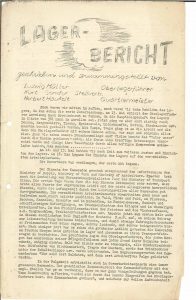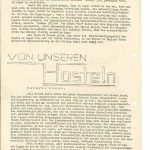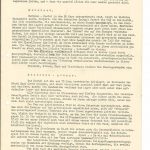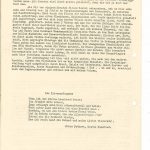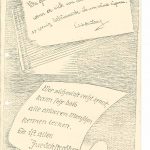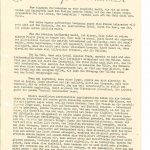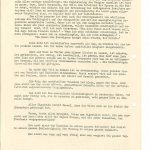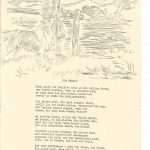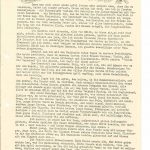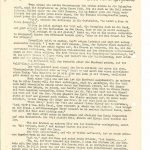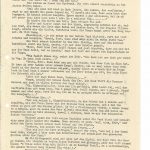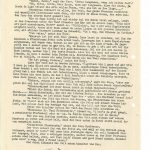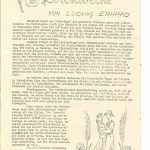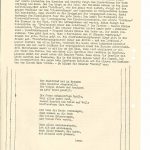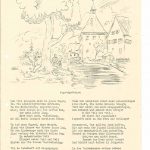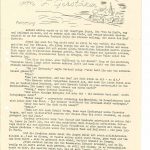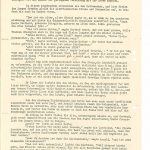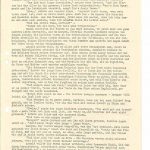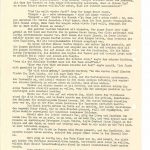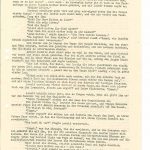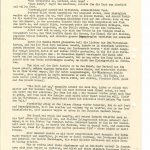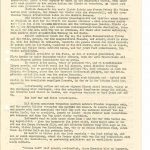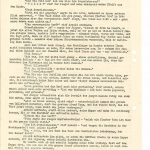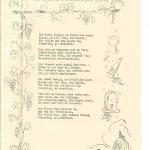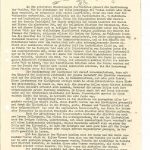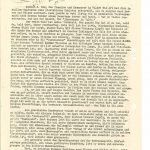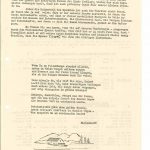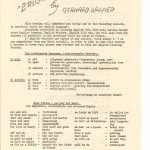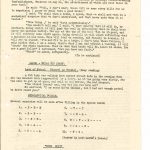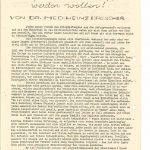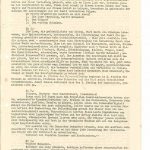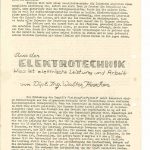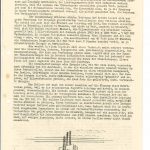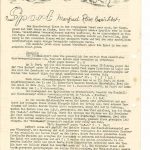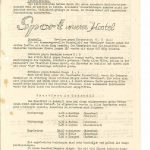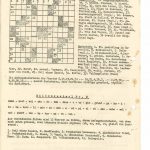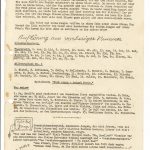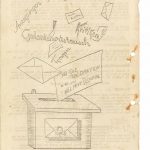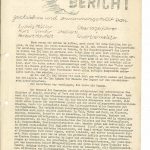Setley Prisoner of War Camp – Newspaper – 01
Newspaper – 01 (of 7) written and circulated by German POWs at Setley POW Camp 65.
Translation: First article (P1 & 2)
Camp Report
Written and put together by:
- Ludwig Müller – Chief Camp Leader
- Kurt Sender – Deputy
- Herbert Haukelt – Quartermaster
We were still in the middle of building and reconstructing the camp when the first surprise hit us. On 13th May the principal camp leader received the order to go to Brockenhurst as the main body of camp inmates, 361 men strong, was approaching. Now the whole operation really got going: blankets, mess kits, tables, food containers, accommodation, beds, straw sacks, etc. had to be provided quickly. The work was started with great speed and when our principal camp leader arrived with his men, lo and behold everything was done. But how did our new arrivals look! Many of them had the ‘Our Father’ prayer blown through their cheeks (1). When they were served a nourishing pea soup, some had overloaded their ballast tanks by helping themselves all too enthusiastically, a few of them……….(2)
On May 14 and May 15, we still had time for further construction and accommodation works at the camp. On May 16, the use of the camp began at the different work stations. The overture was fading away, the first act had begun.
The assignment of the comrades took place according to the requirements of the Ministry of Supply, the Ministry of Work and the Ministry of Agriculture. Later, the presentation of roadworks specialists for the Ministry of Transport was added. The first days were very hard for the assigned, but despite all hardships of the unfamiliar work and the not too great physical strength, the start was survived by all comrades due to their determination for performance. The various work assignments conveyed quite new and partly hitherto unexperienced prospects. In the forest, on the meadow and the field, at rivers, streams, canals, swamps and in bogs, in anti-tank barriers, bunkers and unnecessary fortifications, at war ruins and in former living quarters. In production facilities of peace and rebuilding, e.g. sawmills, tractor garages etc., for the first time in this southernmost part of England, the German POW appeared to contribute to the preservation of life in Britain and to clear possible food surplus for their own badly suffering and heavily afflicted home.
After some time, it had become a familiar sight to watch the comrades’ line up early in the morning and depart for their transport vehicles. Nothing escaped the scrutinising eyes of the chief camp leader who attended the depart of his wards every morning and their return every evening. Soon, nothing could be criticised, all teething troubles were overcome: the entrainment of tin cans, wearing of caps as well as the drinking cup underneath the epaulette. The commander’s greeting words “First, you are soldiers, then workers” had been obeyed. In the aftermath, growing harmony developed in the whole employment of labour. It was due to the deft cooperation between the commanding officers with the English authorities that there were only very few frictions. When complaints were made, they were settled with the quick intervention of the chief camp leader resp. the commander, and most of the time in utter satisfaction of all concerned. The employers judged their work force as very satisfactory and that has not since. Today the camp has proved its competence in deployments in all aspects. Many a one has proved himself as an agriculturist, a drainage specialist or forester, displaying his skill and aptitude to the full. In all directions, this way and that, he travelled through the areas of South Hampshire, feeling lonely when due to bad weather, bloody in the commandant’s opinion, he was forced to remain in camp.
That is not to say that there is nothing to do in camp, that he could perhaps have a rest on the bed (3). On the contrary, enforced leisure hours in camp are fully used through all sorts of lovely games, in form of levelling roads, garden and other paths. We have nearly forgotten to mention one of the most important work places in camp, the commandant’s central office and the main commando office for allocating work, our own ‘labour office’. Who does not know ‘THEM’, the sprinters -Scharr, Petters and Mutert- these tireless people who see to it that the correct numbers of hours is worked and thus guarantee that the account office is able to pay the correct sum to everybody.
Briefly that is all that there is to say about the main work areas of the camp and we shall finish now because paper in England, despite more generous allocation, is still rationed.
Translators Comments:
- The sentence “Vielen konnte das “Vater unser” durch die Backen geblasen werden” literally means “we could blow the Lord’s Prayer’ through the cheeks of many of them”, meaning they were extremely thin.
- The sentence “… eine kraeftige Erbsensuppe vorgesetzt wurde und einige ihre Tauchtanks durch allzu heftiges Zusprechen ueberladen hatten, kam manchen ….. –” literally means “when they were provided with a strengthening pea soup and some of them overcharged their dip tanks because they did it too much justice, some came ….”, probably meaning that they either threw up or had diarrhoea.
- The German expression ‘Matratzenhorchlehrgang’ is slang and not easily translatable. I therefore just conveyed the sense of the word.
Translation: One of the poems (P8)
Home
Happily the seafarer returns home to the silent stream
from islands far, when he has harvested;
like that I would return home, if I had
harvested as many goods as sorrow.
You beloved shores that once educated me,
will you quench the sorrow of love, will you promise me,
you forests of my youth, when I
return, peace once more?
At the cool brook, where I saw
the waves playing, the ships gliding,
there I will be soon; you, intimate mountains,
which protected me once, home’s
honoured safe borders, my mother’s house
and loving siblings’ embrace
I will soon greet, and you embrace me
That, like in bonds, my heart may heal,
you that remained faithful – but I know, I know
love’s sorrow, which will not heal so soon,
this no lullaby does sing, which, consoling,
mortals sing, from my bosom;
for those, that lend us the heavenly fire,
the gods, also give us holy sorrow.
Therefore, it remains so. A son of the earth
I seem to be: made to love, to suffer.
By: Hölderlin
We would like to thank the Mueller family for granting us access to this material.
Can you help others to enjoy the Newsletters?
If you can read German and write English fluently and have a little time to help translate these Newsletters please take a look at the MicroPasts website www.micropasts.org where you can sign up and work collaboratively “with the Crowd” to transcribe the Newsletters http://crowdsourced.micropasts.org/. Once fully transcribed and translated we will that produce a downloadable PDF of the translated newsletters for you to enjoy.
To find out more about the camp see the Setley Prisoner of War Camp – Overview article. Or you can return to the: Setley Documents and Archives Page


